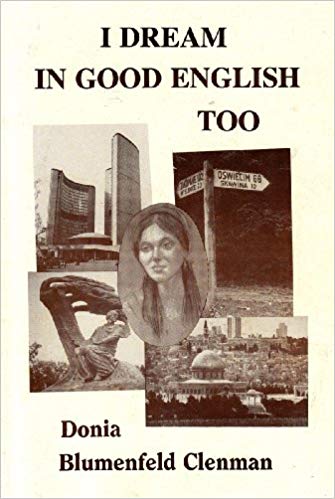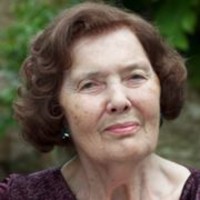In the Aftermath Project, director Sarah Terry reminds us that war is only half the story: "To be fully informed, we have to know the stories of post-conflict." It is in these stories, "where we are constantly redefining what it means to be human, what it means to live again, to rebuild civil society, to recover from trauma. If we don't know these stories, then we don't really understand the world we live in, and we will repeat history again and again and again." Through her poetry, Holocaust survivor Donia Blumenfeld Clenman conveyed some of these essential stories of the aftermath of genocide. With clarity, humanity and gentleness, her words connect us to her struggles, and teach us what it means to face - and recover - from trauma. In the month of her passing, we remember her legacy and honour her words.
In 1988, Donia published "I Dream in Good English Too" (Flower and Littleman, 1988). In it, she reveals a difficult truth many survivors of traumas face: I t is inherently challenging to speak about a traumatic past and all the more so with one's own children. Many survivors of the Holocaust speak about the nightmares and images conjured up with the retelling of past events and the emotional toll of each retelling. For some, survival carries crushing guilt or shame - perhaps in being victimized, perhaps for the actions taken in a time of - to use the words of historian Larry Langer - choiceless choices, or for some, simply for surviving where so many millions did not. Many survivors who became parents also speak about the dilemma of when and how much to share with one's children so they are aware and understand the importance of the past, but not burdened or traumatized by it.

Donia explores the additional challenges that she - like other survivors who became parents - faced in speaking about her past to her children in Canada. She shared this poem with Facing History and Ourselves (published in Holocaust and Human Behavior 3rd ed. resource, pp 480-481):
Sometimes
I am a stranger to my family
for I bring Europe's ghosts
into the well-lit living room of Canadian internationalism
and mobile,
passionately objective youth.
My scars of nicely healed
and my concerns properly intellectual,
yellow with the stamp of legality
of naturalization papers
twenty years old.
Yet somehow,
the smoke of the past darkens Heinz's clear consomme
and, though only a witness,
I spread fear
by my very presence,
a living fossil
at a table worshipping the "Now."
They love me deeply
and tenderly,
yet would exorcise a part of me,
dreading an eruption of memory
no matter how oblique
to force them
into captive partnership.
This is my past
not theirs,
their hostile glances shout.
We are all descendants of Adam.
Why bring Abraham
into happy Canadian homes?
I was no child on arrival
and yet, so well assimilated,
even my verses are native,
and I dream in good English too.
So I put on the ointment of reason
and tape heartbreak with Band-aids
and they are relieved,
and reassured,
to get back their normal Canadian mother.
- Donia Blumenfeld Clenman, "I dream in Good English Too." Flowerfield and Littleman, 1988.
Donia describes here with intimacy and understanding of what 20th century writer and social critic James Baldwin writes about History:
"History, as nearly no-one seems to know... does not refer merely or even principally to the past. On the contrary, the great force of history comes from the fact that we carry it within us. Are unconsciously controlled by it, and history is literally present in all that we do."
Her poem challenges us as readers to consider
- What might it mean for her to live in two worlds?
- How do we reconcile our identity and past lived experiences with the present expectations and needs of those around us?
- What memories and understandings are embedded in language, and what is lost when these ideas are re-formed in English?
Justice?
At the 50th anniversary of the war's end, Donia wrote and shared another powerful poem, titled Justice, which she read for the USC Shoah Foundation's Visual History Archiven. In it, she honours and remembers the lives of victims, she grapples with questions about the possibilities for justice post-genocide, and calls upon her audience to take up the mantle of remembrance:
Justice (for 3 voices - Narrator, Survivor and Victims)
No daisies bloom for Moisheles, Yuselis, Freidelis
No poppies weep for Francoise, Jacqueline, Armand,
Yuri, Vera, Sasha - so shivered Babi Yar
And Cypruses are humbled in Selonica.
In this beginning, there was no justice.
As Civilization was no sister to compassion,
so Law was no brother to Justice.
When one word, "Jew", was the base of human vocabulary.
I saw an endless field of flowers, dead yet swayed.
"What is Justice?" I asked.
And a great voice rose from the field:
"Remember us, Remember us."
Many are my questions
Memory is the only constant
"What of my people who've become ashes, their life a wall of flaming names?
and the children who never saw another butterfly,
with only Kita Korczak [?] to kiss them goodbye,
[who] people the world that stand empty
with tales for all children and those yet unborn
And the evil ones, who make children weep
and prison disciples who darken the face of God
in tongues of fire record their deeds
and teach all children, and those yet unborn.
And the great few who redeemed the conscience of the world - The simple handful who cared:
The Dutch woman who shot the policeman to shelter a family in her care
The Austrian who fought evil by studying Hebrew and the Talmud
The housekeeper who hid 12 in the Polish cellar of a Nazi villa.
Oh, believe in the courage of one.
And the good people of this land - "other-land":
The Historian, the Judge, the Artist, the Rabbi, the Priest, the Jew and the non-Jew
Remember each. Remember all.
And the survivors who doubly survived to raise children, build families, a nation.
Will there be justice in the end?
and that's when the great field shuddered and wept
as each flower were a human face.
"In this beginning, there was no Justice.
And there can be no justice in our end.
Live.
Live.
Remember."
- Donia Blumenfeld Clenman. "Justice". Transcribed from https://sfi.usc.edu/video/donia-blumenfeld-clenman-recites-her-poem-justice
In 2016, Justice inspired a group of students to use the power of poetry to give voice and strength to others.

Thank you, Donia for finding your voice, and so courageously sharing your questions, your struggles, your heart, your teaching, and your friendship with us. May we always heed your call to live and to remember.
Donia Blumenfeld Clenman passed away in Toronto on May 2, 2019.

